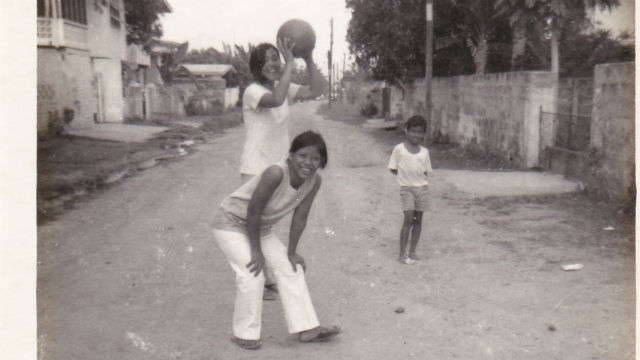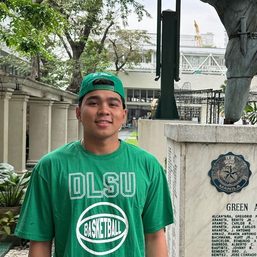SUMMARY
This is AI generated summarization, which may have errors. For context, always refer to the full article.

The following story was produced by NextDayBetter and the law offices of Guerrero Yee LLP Rappler’s #BalikBayan is publishing these stories as part of their series on US immigration reform.
VIRGINIA, USA – Eddie Angeles was born poor in Pasig City, Philippines, and grew up in a poor neighborhood of San Francisco. US President Barack Obama named him the Federal Aviation Administration’s next Associate Administrator for Airports, making him one of the highest-ranking Filipino Americans serving in the United States government. He shares his story of challenges and success with NextDayBetter and Rappler.
You’re a storyteller with a classic rags-to-riches tale. What do you hope people would learn from your story?
Inspiration that anything is possible. You can be born into a family that doesn’t have very much, but if you have the heart and the hard work then dreams can come true. People forget that this country gives you opportunities. Not every country has that, in fact many countries don’t. A lot of immigrants have that obstacle that they can’t overcome in their head. I was raised by a single mom who worked as a maid. English is my second language, and I lived below the poverty line. You have to have hope and faith in yourself.
What gave you the strength to overcome the obstacles you faced as an immigrant growing up in the rough areas of San Francisco?
To me, the driving force was to find a better life. And the key that I realized early on was education. In the Philippines, books were not accessible. I went to the library and was drawn to the fact that knowledge was so accessible and free. So that drove my passion to learn and excel. I still had to have street smarts, though, so in junior high I used to dress like a gang member. I was the guy that pretended to be part of the group but really was not, because I was taking a different path. In my heart of hearts I didn’t want to be in a gang, I wanted to be in school, but I wanted to be safe in school…it was the thing that got me out of the ghetto.
What was your breakthrough moment that led you to where you are today?
The breakthrough for me was a generational one; I give tremendous credit to the Civil Rights Movements of the 1960s. They created opportunities for my generation that were unprecedented, such as the increase of minorities not only in colleges, but in law schools, and in practicing law. If it wasn’t for affirmative action programs, I don’t know what kind of school I would’ve gotten into. I just happened to be in the right place at the right time in history, and I rode that wave into UCSB and UC Hastings.
You mentioned in your talk that it’s just as important to look backward as it is to look forward. What do you find when you follow the dots backward?
I see the opportunities that I actually had the courage to take. Everything I’ve done, with respect to the benefits on the future, had some risks. I was king of San Francisco as the chief counsel for public protection but I left that very comfortable life to be uncomfortable. Now I’m a part of the power structure of Los Angeles, just as much as in San Francisco, and soon I’ll be going to Washington, D.C.…to take over the country.
Alongside your career, you’ve managed to remain incredibly active in Filipino communities and beyond serving as the President of the Philippine American Bar Association (PABA), and as a board member for Search to Involve Pilipino Americans (SIPA) and Filipino American Service Group, Inc. (FASGI) among many others. What motivates you to stay involved?
It’s about giving back your talent because you can’t succeed professionally and personally without standing on the shoulders of those who came before you. I’m paying it forward because I love to mentor young people. At the same time I do it because there are those who have mentored me. That’s what these organizations are about, to give them a vision about what the possibilities are.
What’s your stance on undocumented immigrants and illegal immigration?
I’m not against undocumented immigrants. I am against illegal immigration and do think we need to create policies that deter it. I don’t believe that there’s an easy fix, but I immigrated legally and followed all the rules. As a trained lawyer, I believe in abiding by the law and illegal immigration is against the law. The conscious determination to come here illegally, that act I can’t condone because it would be in opposition to everything that I stand for (when you have young kids that were brought here, however, that’s a different story, like with the DREAM Act). There’s a process, there are rules and regulations. There are those who wait in line, and then there are those who cut the line, and how is that fair? I say try to change the laws to make the system more effective; don’t break the laws. How does that work for society if you put your own dreams before the whole? Then the whole structure of society would break down if that were permitted.
You’ve broken a ton of ceilings for immigrants, for Filipinos, and for people living below the poverty line. Do you have any tips for others who want to do the same?
Never be afraid to fail. That’s really pretty critical. I haven’t always succeeded in everything I’ve done. I’ve entered into races and dropped out or lost, I’ve applied to many, many jobs and didn’t get them. I didn’t get into any Ivy League schools yet I’ve taken my career to a level that many of my colleagues who did go are not even striving for. After the no comes around, you open up new doors, you keep trying. It’s up to you at the end of the day to reflect back on your life and say you did what you wanted to do. – Rappler.com
NextDayBetter is a New York-based organization that ‘highlights inspiring changemakers, creatives and entrepreneurs from the diaspora focusing on creating a better future.’
A Rappler Hangout with immigration activist and Pulitzer Prize-winning journalist Jose Antonio Vargas produced in collaboration with NextDayBetter and Guerrero Yee LLP will happen next Thursday. Details here
Add a comment
How does this make you feel?









There are no comments yet. Add your comment to start the conversation.